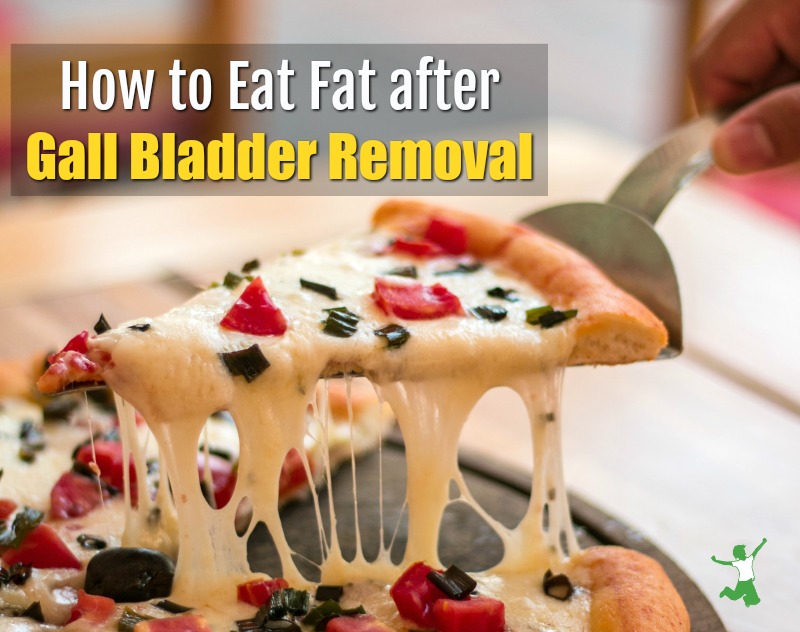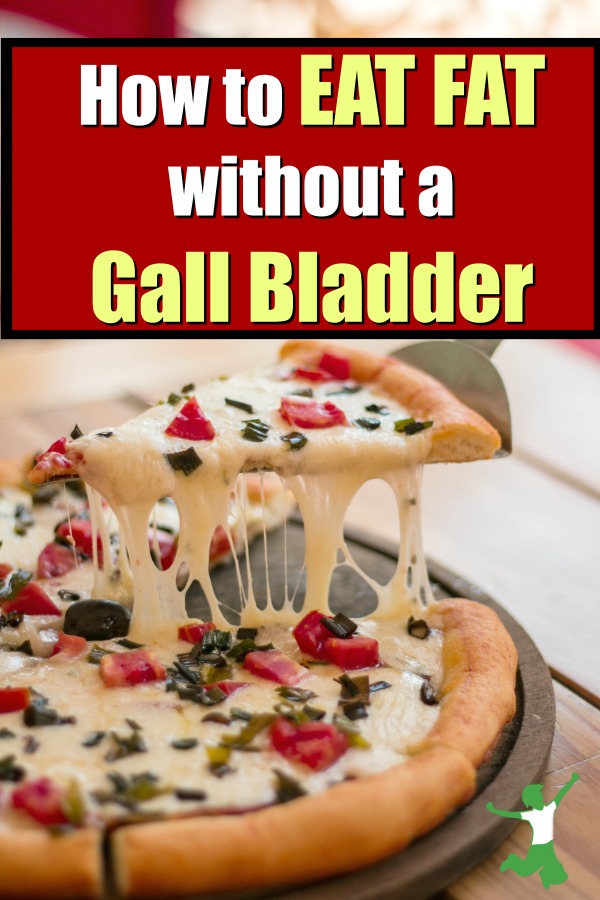How to eat fat comfortably without digestive distress after gall bladder removal. This ensures adequate fat-soluble vitamins in the diet for optimal health and vitality.
How to eat fat comfortably after gallbladder surgery seems to be an increasingly common dilemma nowadays. You have to wonder if these people tried a simple, doctor-developed gall bladder cleanse before deciding to go under the knife.
Sadly, their practitioners probably never suggested this first.
Why in the world are so many people having problems with this small organ that aids in fat digestion by storing and concentrating bile produced by the liver?
Could the gallbladder laparoscopic surgery epidemic that is occurring even in young girls be related to our fat-phobic society? (1, 2)
Constantly eating rancid fats or avoiding healthy ones like butter has the potential to trigger a malfunctioning or atrophying organ from lack of proper use.
Whatever the reason, there are indeed a lot of folks walking around without a gallbladder. Many are under the incorrect impression that after removal they can no longer eat fats without digestive discomfort.
YES! You Can Eat Fat without a Gallbladder
The first thing to realize after gallbladder surgery is that you can most certainly still eat fat.
The bile necessary to digest most fat is made in the liver, not the gallbladder, and you still have a liver, right?
What you really need is a dietary strategy that compensates for the fact that your body no longer has a place to store and concentrate the bile.
The approach is similar to a person who has had her appendix removed. These people must replenish beneficial flora after intestinal illness because there is no longer a place where good bacteria remain secure during bouts of gastroenteritis.
Please note that the tips outlined below are also very helpful to those who have been eating lowfat for a long time and are just now coming around to the fact that whole, traditional fats in the diet are critical to health.
Many times, folks who start to embrace and eat a plentiful amount of fats again after many years of avoidance experience the same digestive challenges as someone after gallbladder surgery. It’s almost like their bodies have “forgotten” how to digest fats!
So whether you are adjusting to life after gallbladder surgery or simply trying to adjust to eating fats again, keep these tips in mind for making the transition that much easier.
Cholesterol Needed After Gallbladder Surgery
It is very important thing to realize after gallbladder surgery that you still need cholesterol to produce bile which assists with the digestion of regular long-chain fats and oils. Note that short or medium-chain triglycerides like coconut or palm oil do not require bile for digestion.
One of the benefits of cholesterol is the easy production of bile. The very foods that have sufficient and healthy quantities of cholesterol are those that are, you guessed it, quite fatty, like liver, egg yolks, cream, and butter. (3)
Avoiding fat after gallbladder surgery is potentially going to compound problems with digesting fat in the long run as you won’t be getting the healthy, unprocessed cholesterol you need to produce bile!
Do you see the vicious cycle that can occur if you avoid fat after gallbladder surgery?
Please note that this discussion does not include oxidized cholesterol like what is in pasteurized, homogenized dairy (UHT organic milk and skim milk included) and the vast majority of processed foods.
Oxidized cholesterol is to be avoided in the diet and is the type of cholesterol that can trigger heart disease. (4)
Bitters Stimulate Bile Production
Once you are comfortable with the fact that you can and should eat fat after gallbladder surgery and that it is wise to do so in order to provide your liver with the raw materials necessary for bile production, the next step is to “train” your liver to produce the bile. This way, you will have the digestive juices you need at the proper time to digest the fats you eat with your meals.
Eating at regular intervals that your body can adjust to can go a long way toward this goal.
If a regular routine for consuming your fats does not prove helpful after a period of time or you are temporarily off schedule for whatever reason, use of traditional bitters or quality digestive enzymes can be used in conjunction.
Herbal bitters are plant-based extracts that are rich in minerals (vetted and recommended source).
Bitters work better than digestive enzymes in my experience. They are an ancient tonic for stimulating the liver to produce bile.
Traditional Asian cultures have long valued bitters for their digestive benefit. They also use them for their cleansing properties which promote increased strength and healing.
A single teaspoon of bitters in a small amount of water in the morning and in the evening should be sufficient to stimulate your liver to produce adequate amounts of bile. A spoonful of cold-pressed, organic sunflower lecithin after a fatty meal can also be helpful.
Still Can’t Eat Fat Comfortably After Gallbladder Removal?
If despite all your best efforts, you still have digestive issues with fats after gallbladder surgery, you can use a bile salts supplement to assist you.
Supplements should be a last resort, however. It is always best to encourage the body to do its job unassisted if at all possible.
The important thing to keep in mind is that the need for healthy, unprocessed fats does not change after gallbladder surgery. You still need these fats for optimal health. Therefore, finding a way to consume them comfortably is of paramount importance.
Keep in mind the research of Dr. Weston A. Price. The most revered foods in ancestral cultures were all fatty and of animal origin. These foods contained large amounts of Vitamins A, D, and K2 which were responsible for their strong, sturdy babies and children, resistance to chronic and infectious disease, easy fertility, and vitality into advanced age.
These fat-soluble activators supercharge mineral absorption into the tissues. Thus, eating lowfat is a recipe for disaster! It will likely contribute to a mineral starved state and other deficiencies and health challenges over time.
Fat is a critical nutrient that you cannot do without and still enjoy vibrant health.
Finding a successful strategy for consuming foods with the fats you need is the best approach after gallbladder surgery…not avoiding them as recommended by conventional medicine.
References
(1) More Young Women Suffering from Gall Bladder Disease
(2) Your Gall Bladder Needs Fat!
(3) Digestion and Absorption of Food Fats
(4) Atherosclerosis. 2000 Mar;149(1):181-90









My gall bladder has removed 2002. Now it is 2012. After 10 years I did not get any proper solution to digest food especially fatty food. As far as I know fatty food is trigger for my health. Almost every time I am suffering from diarrhoea and steatorrhoea. But taking milk powder after meal lessen my suffering.
I had to have my gallbladder removed a few months ago and I appreciate this article to help me understand the cause and how to approach eating fat moving forward. Since my surgery I found drinking raw milk is harder on my digestive system and I was wondering if I had to give it up. Question: are the herbal bitters safe while conceiving or during pregnancy?
make milk kefir from grass fed cows producing raw milk-millions of probiotics…we use a gallon every 2 days here! dog gets it too!
The reason this site activates some security warnings could be that it has unusual settings to prevent some of its content being highlighted for “cutting and pasting”.
A very useful article. I believe that low fat diets may be part of the reason that so many people are having gall bladder trouble.
One day, someone I knew collapsed in agony, grabbing at his body. I helped him sit up, and he asked me to drive him to the emergency room, which I did. They soon diagnosed him with a badly inflamed and infected gall bladder, and rushed him into surgery to remove it. It turns out that he had no history of gall bladder trouble, but had gone on an extremely low fat diet for about a year. The surgeon told me that was what caused the gall bladder trouble, though it did not happen to everybody. This person was in his late thirties at the time.
Gall bladder infection and removal used to be very rare, when folks ate traditional diets.
I use Microsoft Security Essentials…it’s just as good and best of all it’s FREE Just go to microsoft.com and download it.
Thank you for the info! I had my gallbladder out 4 years ago and have never had much success finding diet info post-surgery on the internet. My situation was extreme: I’d been eating a high-fat diet largely consisting of fast food. I gave it all up and lost 80 lbs in 9 months. It took them so long to diagnose gallstones (about a year with a couple of attacks a month), that I had developed pancreatitis as well. The first year or so after surgery, I would almost always run straight to the toilet after eating a high-fat meal. It’s gotten better, but I still have those times. I’m thankful to finally have some coping strategies!
A couple of things my doctor told me that weren’t mentioned here:
– It’s not that we don’t need a gallbladder, it’s that by the time it’s dysfunctioning, our bodies (esp liver) have already learned to process fats without it
-There was no recommendation of any type of diet, low-fat or otherwise
Yes. I am curious about why it would target your site; maybe an advertiser?
When I had my gallbladder removed 18 years ago, my doctor said “you don’t really need it”. Ha! I wish I had been into a healthier lifestyle and sought another option. I never had any issues with any foods after surgery, but it wasn’t until about 10 years ago that a naturopath told me that I need to take bile salts and vitamin D for the rest of my life. Apparently, when the gallbladder is removed, there’s still a small piece of it left that can drip acids into the intestines, resulting in an increased risk of cancer in that area. I hadn’t heard about the possibility of celiac disease. Now that I’m 51, I feel like I need to start over and try a Nourishing Traditions style of diet, but I’m overwhelmed and not sure where to begin. Any suggestions anyone? Thanks!
Small steps! My family has been on this new health journey for about 6 months now, and we didn’t make all the changes at once. I was a little overwhelmed and intimidated at first. But with practice, it all comes naturally (no pun intended). It’s like second nature now to buy and prepare foods that nourish. I would never go back to my SADist ways 🙂
When it came to giving up wheat, at first I still allowed half a piece of bread with my eggs and bacon at breakfast, and no other grains the rest of the day. Before long I gave that serving up too, and I really haven’t missed it. That’s just one example of the switchover.
Good luck to you.